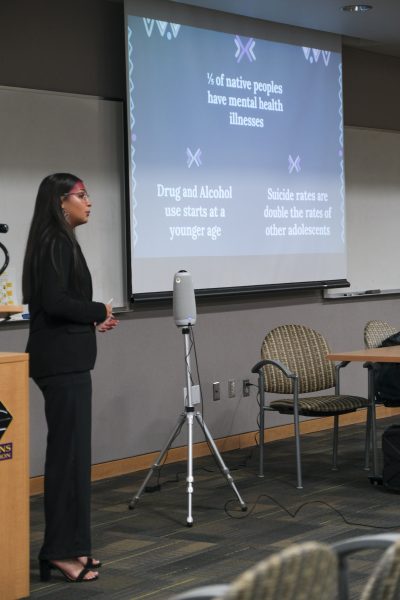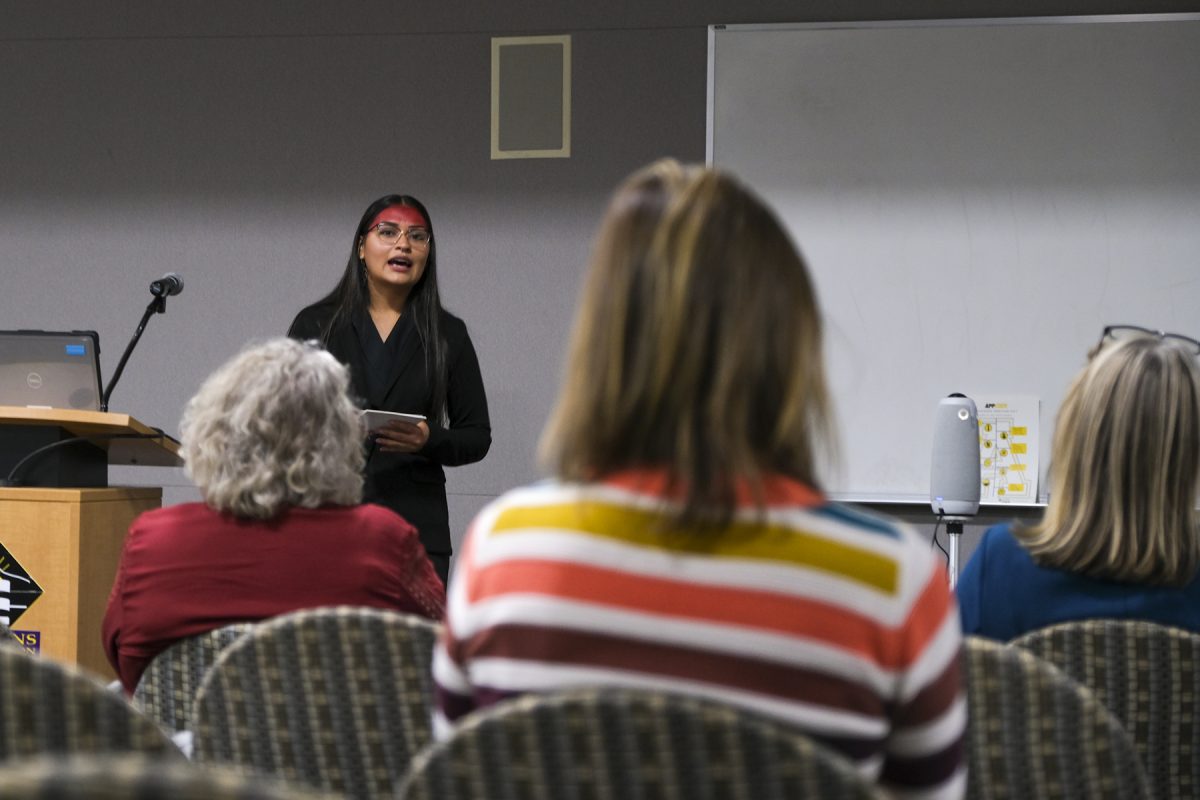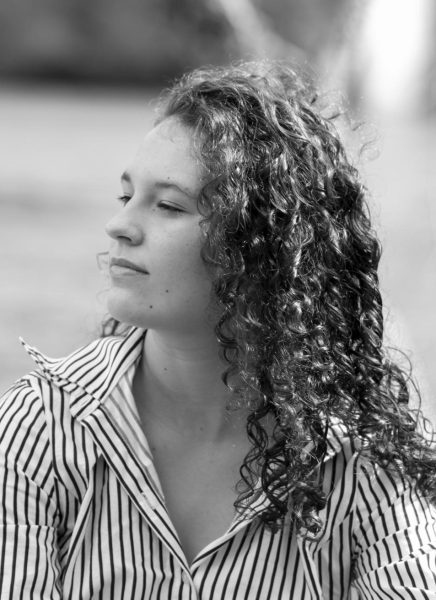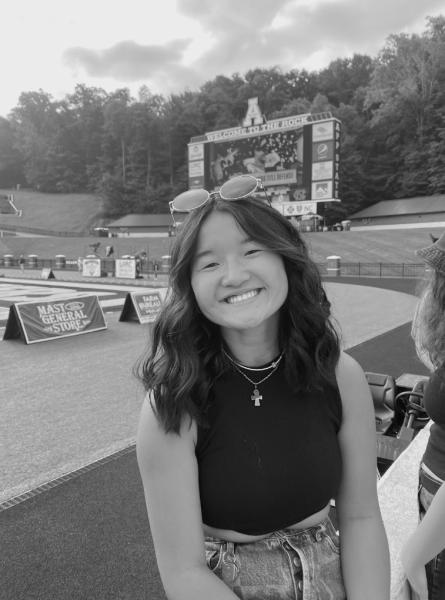In honor of Native American Heritage Month, The Gadugi Partnership and Student American Indian Movement hosted Cherokee Central High Schooler Alitama Perkins. The teen spoke to the public on Monday about historical and generational trauma, resilience and healing within the native community.
Accompanied by her grandfather Kim Chiltoskie, whom she refers to as “Dad,” Perkins herself is a member of the Eastern Band of Cherokee and comes from the Deer Clan.
The event took place in Plemmons Student Union and was hosted on Zoom as well.
Allen Bryant, the founder of the Gadugi Partnership, referred to Perkins as a “young elder.”
Perkins introduced herself to the audience in her native language, Tsalagi.
During her presentation, Perkins spoke on personal experiences in her family, as well as the history surrounding forced removal and boarding schools used to force assimilation. She also spoke about the importance of education, and how Native history is often taught incorrectly, or not at all.
Perkins discussed how trauma can be “passed down from generation to generation,” and can have lasting impacts on future generations.

Perkins also said trauma can last a lifetime, with many survivors of the boarding schools refusing to speak their native language out of fear. She described trauma as a “natural response to a terrible event,” and said historical trauma is specific trauma to major events in the past.
“Some of the people who went through this as children never spoke of it again,” she said.
Perkins said many survivors suffer from multiple trauma responses throughout their lives, which include “depression, low self-esteem, isolation, anger and self-destructive behavior.”
“One-fifth of Native Peoples have mental health illnesses,” Perkins said.
She also said drug and alcohol use starts at a younger age in Native adolescents, and suicide rates are double the amount of their peers.
During her presentation, Perkins shows images of children in U.S.-owned boarding schools. She invited audience members to share what they noticed about the images while highlighting that the children in the images have short hair. Perkins described the importance of hair, as well as the erasure of cultural identity caused by the forced removal of hair.
“There, they would cut their hair and scrub to the bone to remove the brown from their skin,” Perkins said. “That was a war that you could not physically win.”
She listed the abuse that took place in the schools and said she had picked through different sections when deciding what to share in her presentation.
“I had to pick through sessions to share,” Perkins said. “And the fact that I had to pick through sections that were too vulgar and too violent says a lot.”
Included in her listed forms of abuse in the schools were starvation, testing, torture, rape and sexual assault, death and pregnancies.
“There was no guidance, there is no love, there is no peace,” she said. “Us being able to educate lets us give some of that back.”
Perkins included a quote from the Carlisle Indian Boarding School which said native children “cannot become truly American citizens, industrious, intelligent, cultured civilized until the Indian within you is dead.” Carlisle Indian Boarding School operated for 39 years.
Perkins said she had family members who were in boarding schools, and she has felt the generational and historical trauma that resulted from it.
Due to the forced removal, abuse at the hands of government officials and boarding schools, many survivors chose not to speak their native language. Perkins links this response to the continued trauma that was caused.
“These people were punished so brutally that it killed them,” she said. “But what can we do, today, to break this cycle?”
Perkins said one way to end the generational trauma caused by the abuse is through education, and working to educate future generations about traditions and cultures. She said she has been working to learn her native language, while also teaching her grandfather how to speak it.
“I’d rather my children struggle to speak English than struggle to speak our language,” Perkins said.
She said learning the language “can be as simple as one word a day for a year,” with the end goal of “365 new words in your language.”
Perkins also said community can help those who have felt the traumatic effects.
“Yes, we are Indigenous people, we’ve had a lot of bad things happen to us. But does that mean we need to hide?” she asked, referring to her community. “No. We need someone to hold our hands, we need community.”
After the end of her presentation, Bryant said Perkins “greeted us in a language that is thousands of years old,” and invited the audience to “look at the Cherokee, and how far they have come.”
Perkins intends to pursue a career in archaeology and aims to continue educating and speaking on generational and historical trauma. Accompanied by her grandfather, Kim Chiltoskie, Perkins has been speaking and educating for about two years.
“I want to go into archaeology to make a difference for the bones in the grave sites,” she said, regarding a visit to the Carlisle boarding school site. “I’d rather me be handling something like that than somebody else that doesn’t understand how precious that is.”
She said many “Western influenced archaeologists believe that when bones are dug up, they lose their value.”
Perkins said that she does not believe that the bones lose their value and the connectedness is not lost due to their age.
Perkins said she gives thanks each day for being able to open her mind to learning and experiencing new things each day, and for getting her to where she is, as well as being grateful for her family’s continued support.
Chiltoskie’s name translates to falling flowers like when the wind blows and the tassels in the middle of the flower that gets pulled when the wind blows, Perkins said. Her grandfather “noticed her gift when she was in fifth grade.”
Perkins said that she wants to continue to speak and educate others about the shared trauma. She shared that by continuing to educate others, she is able to give back to those who were killed.
Perkins believes that through proper education, the lives that were lost can be remembered and honored.
“You being here means we are seen,” Perkins said.



